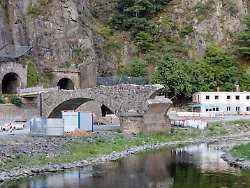A year ago, extreme flooding devastated parts of Rhineland-Palatinate and North Rhine-Westphalia, killing over 180 people. Such heavy rain events will repeat themselves. The guests at Markus Lanz say that they can be prevented from having catastrophic consequences.
Nobody will soon forget the images of the water masses that devastated the Ahr Valley in particular a year ago. On July 14th and 15th, 2021, after heavy rain, incredible amounts of water flooded parts of Rhineland-Palatinate and North Rhine-Westphalia. More than 180 people lost their lives in the floods. On Thursday, among others, Federal President Frank-Walter Steinmeier commemorated the victims of the disaster. First he visited the badly hit Ahr Valley and then took part in a memorial service in Euskirchen near Bonn. In both places he called for the fundamental conclusions to be drawn from the catastrophe as quickly as possible. The Prime Minister of North Rhine-Westphalia, Hendrik Wüst, described the flooding as a result of man-made climate change.
On Thursday evening, the events and their consequences are also a topic for Markus Lanz and his guests on ZDF.
“Information must come quickly and understandably”
The North Rhine-Westphalian Minister of the Interior, Herbert Reul, found out about the disaster while he was on vacation. He immediately got in the car and rushed to the crisis region, says the CDU politician. “I understood what really happened when I saw it there,” he says. The images of the deep craters, the roads that no longer exist, he can’t get them out of his head. “Then it’s no longer television, it’s at home.”
He still cannot explain who is to blame for the fact that the local people were not warned in good time. Now Reul wants to ensure that a similar catastrophe cannot happen again. In the meantime, his ministry has purchased the first sirens. The nationwide Cell Broadcast warning system is scheduled to start at the end of this year. This means that warnings are sent as a push message to all mobile phone users who are registered in a specific radio cell. There are already warning apps for smartphones, such as the Nina system.
However, these reports are not sufficient for Reul. The users would also have to be able to understand them, they would have to know how to behave.
Wohlleben demands: prevent flooding
For book author and forester Peter Wohlleben it is important how people are warned of catastrophes of a similar magnitude. But more important to him is how to prevent them. “The main problem is what we do to ensure that the water doesn’t come back into the valley in the first place,” he says.
According to Wohlleben, the floors are a problem. They are naturally very receptive and can soak up water like a sponge. However, much of the soil has been lost to historical agriculture and logging. Wohlleben: “For every square kilometer of arable land, two hundred tons of soil are lost through deforestation – every year.” As a result, the soil had become less and less receptive. Then agricultural machinery weighing up to 70 tons would have flattened him. “The soil loses up to 95 percent of its absorption capacity,” says Wohlleben. Soil fungus, once crushed by agricultural machinery in this brutal way, can never regenerate. Water collects on the floors instead of inside.
Another problem: too many trees would be cut down in Germany. “Where we have old beech forests, there has been almost no water runoff,” says Wohlleben. Forests cannot prevent flooding, but they can extremely slow down water runoff, says the book author. “Forest has a great interest in holding water and storing it for times of drought.”
Wohlleben has one wish: you have recognized the mistakes, now you have to tackle them, “Even if it hurts,” he says at Lanz.
North Rhine-Westphalia has now taken a first step, albeit a very small one, says Herbert Reul: “We have now planted ten thousand trees.”
